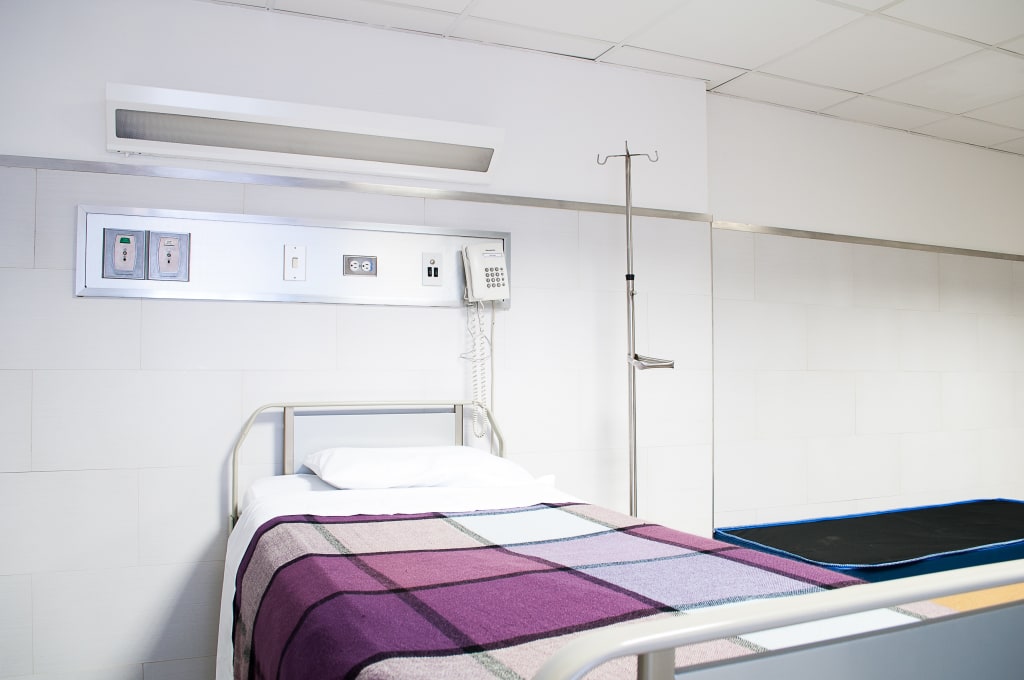
Writers Note:
The following story mentions trauma related assaults, childhood trauma and psychotic religious experiences. The stories of the psychiatric unit are meant to reflect lifesaving treatments and not to discourage others from staying out of an acute care inpatient unit.
****
I’ve been carrying the burden of Bipolar 1 Disorder for 20 years. As a victim of childhood trauma, I had my first bout of mania when I was 23 years old. It was driven heavily by PTSD—and a stranger found me wandering my university campus in the rain. I didn’t even know my name. I ended up in the ER, but was not diagnosed with Bipolar at that time, which in hindsight, was my first manic break associated with PTSD. It was four years to the date of a traumatic sexual assault which had happened to me and almost destroyed my life.
My true diagnosis came much later, after the birth of my second son. I began having obsessive, ruminating and intrusive thoughts. I stopped sleeping. I began losing my memory, to the point of not recognizing my friends or family. I was filled with rage and anger. With a diagnosis in hand, I began working with doctors and developing a medication regimen. For me, the medications did not work. My body could not metabolize the drugs and I continued in a state of rapid cycling mania for a period of 8 years, all while trying to raise a small family. I tried six different antipsychotic drug cocktails, all to no avail.
I lost four jobs due to my aggressive nature, memory loss, inability to focus, hypersexuality, and other bipolar symptoms. I was stigmatized for my mental health disorder and was escorted out of two jobs by security officers. During that time, I was hospitalized twice. My first hospitalization and psychotic break hit me on January 14th—exactly 25 years to the day that I was a victim of the assault. I didn’t sleep for almost three days. Trauma memories sheathed me. I eventually wound up in a catatonic state with my husband calling an ambulance for me to be admitted into the psychiatric inpatient unit in the hospital.
Acute hospital units are designed to keep you safe during a mental health crisis. They may resort to drastic measures to secure your safety. My days in the hospital were dangerous, as I had no working memory. I did not know who I was. I did not know my husband or recognize I had children. I was psychotic, delusional and hallucinating. I saw many of my dead relatives in the room, which was heavily padded as I attempted multiple times to escape the room through the locked-down windows. I was convinced that I was going to be rescued by Barack Obama on Air Force One. I had psychotic delusions that I was best friends with Jay-Z and Beyonce, who were desperately attempting to rescue me. Hip hop music played in my head—repeating lyrics bombarded me in loops. Elevated thoughts and grandiose ideas are a hallmark symptom of a bipolar break. Oftentimes, patients believe they are famous, uber-rich or a God.
I remember being pinned to the floor by five nurses, who had to give me a powerful shot of an antipsychotic drug—as I refused to be medicated and was highly combative. The most difficult thing for me was believing my husband was in the room, and he too was prying open the windows to get me out via a hovercraft. Many patients were in straightjackets, and I had an altercation with another patient which almost led to a fist fight. She too was suffering from a psychotic break, and it was a serious complication for both of us to be ‘loose’ on the unit at the same time.
My time in the inpatient unit lasted for 7 days. As I was coming down from my mania, another patient joined me at the breakfast table, where I was drawing and coloring and praying to God to rescue me—as I kept a journal while in mania. He looked at me and said, ‘Welcome back. I can see your delusions and hallucinations are gone for now.” He said he had been watching me for several days and could see me coming back from the brink. It took me six months to recover from this severe mental health break. I credit the Cleveland Clinic for saving my life. They prescribed the correct medication regimen that eventually started to release me from my manic state.
It took me six months to return to a normal life. During that time, I could not drive since I would continually get lost—my brain did not have the capacity to make quick decisions, especially while driving. My community stepped in at this point, which too, was a lifesaver. Friends watched my children, even though I didn’t know who they were at the time. They brought dinner. They fixed my car. They babysat me since I was considered a suicide risk—although I never had suicidal ideations or any thoughts during my mania of self-harm. After six months at home, I returned to my workplace. I was barely functioning by the time my second psychotic break hit me on January 14th of the following year. Exactly 26 years to the day of my assault and one year to the day of my first hospitalization.
This break was different, but the same in many ways. The danger for me is that my psychotic break happens within 24 hours from me being perfectly fine and living my life. I was out bowling on the night of January 13th with my family. We always celebrate family Fridays with some sort of entertaining activity. By January 14th, I was actively hallucinating and delusional again. My husband knew right away what was happening and drove me to the hospital himself. We had learned how a psychotic break materialized and avoided the ambulance the second time around.
In the waiting room of the inpatient unit, while they were checking me in, my husband slow danced with me to calm my raging spirit. I already had the romantic music repeating in my mind. I was trying to break down the doors and escape, and many security guards kept me safe. My check-in went fast. They moved quickly to move me through the process as I, once again, waved good-bye to my precious husband. I knew the protocol for admittance to the unit. No hooded sweatshirts. No strings allowed. Strings and hoods could be a danger to anyone who tries to harm themselves.
As I descended the elevator to the basement unit, I met the nurse who would be caring for me. At that moment, my primary concern was rescuing any refugees that may be inhabiting our planet. The nurse herself was from another country, and quickly recognized I had a soft heart. As they checked me into my room, the orderlies arrived to administer my antipsychotic shot. Again, you could see the innocence in me, as I repeatedly asked the nurses if they were ‘okay’ for being called to administer my meds. I asked them continually if it was hard for them to work on the inpatient unit, as it seemed to be a heavy load. Eventually, they had to pin me to the wall with my arms behind my back to give me my lifesaving antipsychotic cocktail. The entire time I was worrying out loud about the refugees in the refugee camps around the globe. Would they make it? Would they survive?
I met friends this time on the unit. In my hallucinogenic state, I proceeded to give away all the clothes my husband had carefully packed for my stay. I was convinced I was emulating Jesus Christ and wanted to share with the underprivileged population. I gave away my favorite sweatshirt to a patient who was being admitted for 90 days. This stay, even more so than the first, tended to call on my faith in a higher power. Religious experiences are often experienced during a psychotic break.
My stay this time was short. In a matter of two days, my refugee nurse had collected all the clothes I had given away, and my medication had completely restored me—doctors tripled the dose of the antipsychotic drug the Cleveland Clinic had put me on the previous year, and it worked. My special nurse released me by day three, and she was beyond happy to see my progress. The protocol is to move to an observation unit with other patients who had been released or were suffering from clinical depression. I spent one day on the observation unit and was allowed to go home.
Luckily, I stayed stable for four years. During that time, I leaned on humor to carry me through the memories of the hospital stays. I learned to joke about my time with Jay-Z and Beyonce, as well as my time with Barack Obama. I entertained friends with my tales of hovercrafts and padded walls. Laughter, as they say, is often the best medicine. I knew if I were to be hospitalized again, I would be prepared that I may try to emulate Mother Mary or a Catholic nun. I might even have a costume picked out to take with me ahead of time. I realize bipolar disorder is devastating—and I am not making light of it. It can be scary, dangerous, and crushing for some people. I know humor carries me through difficult times, so I choose to gravitate toward laughter. I’ve built a community of friends and family who function as my lifelines during my times of distress.
My third trip around the bipolar sun just occurred last week. Stress is a mitigating factor in driving bipolar breaks, and my family has experienced some very difficult times this month. My interning psychiatrist also chose to put me on ADHD medications six weeks ago. We had discussed the dangers of ADHD meds inducing mania—but I conceded. I wanted to treat my ADHD, which is often a comorbid condition alongside bipolar. The interesting fact is that it is October, not January, so this manic episode did not follow my typical anniversary date.
The first sign of mania for me is always sleep deprivation. Last week and this week, I got up at 4 am every morning to work, clean my house, and busy myself. I am NOT a four am riser by any means. Once I had agitated sleep for three days, we knew mania had kicked in. I had pinpoint pupils, which is the first visible signal of mania. The primary goal was to not flip into full mania, with hallucinations and delusions, and to keep me out of the ER and yet a third hospital stay.
Due to quick responses from my psychiatric team and my family physicians—they knew to double the dose of my miracle drug and stop my ADHD medication immediately. They prescribed a sleep aid to bring me down in the evenings, and for the most part, the regimen was successful. Once again, my community stepped in. My friends brought me lunch. They picked up my kids. They drove me around—and of course—they laughed with me about preparing to board the hovercraft once again. My bosses and the non-profit I work for are incredible, and they took a crash course in mania with me. They handled it with grace and forgiveness, and I knew the entire time I was in no danger of losing my job this time around. My sixteen-year-old son remembers my hospital stays, which were traumatizing to both him and my husband. With unbelievable help from them, they were able to support me. As I was ‘coming down’ from mania, I only experienced one panic attack—at a gas station (see my next story). My best friend is a mental health therapist and was able to step-by-step walk me through deep breathing and de-escalating exercises. She stayed on the phone with me as I drove the ½ mile trek to my home.
As I write this, I’m on my last day of mania. My feet are solid on the ground. I’m beginning to sleep. I’m able to drive—except for downtown Indianapolis—which on a good day gives me pause. I’m sitting outside in the fall leaves, watching the sunrise. I’m listening to the birds and the owls on my patio. I am in constant contact with my family, friends, community, and my physicians. I am compliant on my medication. The true key to managing bipolar is to find a medicine regimen (that works) and stick to it.
I could go on for years trying to explain the intricacies of a true psychotic break. For those of you who are experiencing it currently, I recommend these things:
• Find a doctor and a medicine regimen that works.
• Have a safety plan in place.
• Find a community who can support you.
• Determine what it is that helps you cope. (Laughter, for example)
• Initiate a regular schedule and rhythm to help you stay on track. (sleep, eat, live, repeat)
If I could help just one person in this world recover and survive a bipolar break, my life would have become a catalyst for change. This is my calling. I wish to write compelling, lifesaving stories as my way of giving back to our burdened mental health communities. Until then, I’m practicing balance, living my life, loving my family, and trying to stay calm. If that doesn’t work, I can always call on my God who has been there for me the entire time. That, or pack for my next trip around the bipolar sun-costumes and all.
About the Creator
Stacey
I'm an aspiring writer who's been curtailed by a history of psychotic breaks, PTSD and lived bipolar experiences. My writing is raw, real, and true. I continually combat the stigma of mental health disorders and I write transparently.






Comments (1)
Interesting, I am glad the hospital was helpful. I think of hospitals as environments were there is very real communication with the patient. It was interesting to hear you describe your psychotic ideas of live. Thanks for sharing